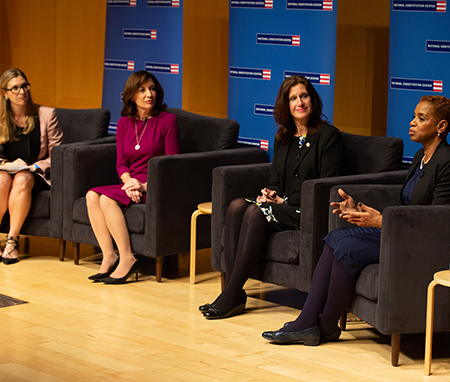How are the U.S. and Indian constitutions alike—and how do they differ? Join two leading Indian constitutional law experts and senior advocates at the Supreme Court of India—Arvind Datar and Menaka Guruswamy—and American comparative law expert Tom Ginsburg of the University of Chicago Law School, to discuss the similarities and differences between the U.S. and Indian constitutions and explore the biggest constitutional issues currently facing both nations. Jeffrey Rosen, president and CEO of the National Constitution Center, moderates.
This program is presented in partnership with the Vidhi Centre for Legal Policy.
Video
Podcast
Participants
Arvind P. Datar is a senior advocate with decades of practice at the Madras High Court and the Supreme Court of India. He practices before the Supreme Court of India and various High Courts and has also appeared in arbitrations held at the International Court of Justice, The Hague. He is the author of several commentaries and books, including the Commentary on the Constitution of India, and was also the former Joint Secretary of the Tamil Nadu Mediation Center, Madras High Court.
Menaka Guruswamy is a Senior Advocate at the Supreme Court of India. Through her constitutional litigation practice, she has successfully achieved various reforms, including working to overturn section 377 of the Indian Penal Code that criminalized same-sex relations. She was the B.R Ambedkar Research Scholar and Lecturer in Law at Columbia Law School from 2017-2019, and her publications include a co-edited volume of essays on Founding Moments in Constitutionalism and an essay on "Constitution-Making in South Asia," in the Handbook on Constitution-Making.
Tom Ginsburg is Leo Spitz Professor of International Law at the University of Chicago Law School. He is also the Ludwig and Hilde Wolf Research Scholar and a professor of political science at the University of Chicago. He is the author of several books, including Democracies and International Law and How to Save a Constitutional Democracy (with Aziz Huq). Ginsburg currently co-directs the Comparative Constitutions Project, an effort funded by the National Science Foundation to gather and analyze the constitutions of all independent nation-states since 1789.
Jeffrey Rosen is the president and CEO of the National Constitution Center, a nonpartisan nonprofit organization devoted to educating the public about the U.S. Constitution. Rosen is also professor of law at The George Washington University Law School and a contributing editor of The Atlantic.
Additional Resources
-
Constitute: The World's Constitutions to Read, Search, and Compare
-
Menaka Guruswamy, The New York Times, "India's Supreme Court Expands Freedom"
-
Samuel Warren and Louis Brandeis, Harvard Law Review, “The Right to Privacy”
-
Nuno Garoupa and Tom Ginsburg, Judicial Reputation: A Comparative Theory
-
India.com, "Republic Day 2022: Know the History, Significance And Why is it Celebrated?"
-
Tom Ginsburg and Aziz Huq, Journal of Democracy, "Democracy's 'Near Misses'"
-
Morris Kiruga, The Africa Report, "Kenya: Constitutional crisis after calls to dissolve parliament"
-
Nikul Joshi, World History Encyclopedia, "Caste System in Ancient India"
TRANSCRIPT
This transcript may not be in its final form, accuracy may vary, and it may be updated or revised in the future.
Stay Connected and Learn More
Continue the conversation on Facebook and Twitter using @ConstitutionCtr.
Sign up to receive Constitution Weekly, our email roundup of constitutional news and debate, at bit.ly/constitutionweekly.
Please subscribe to Live at the National Constitution Center and our companion podcast We the People on Apple Podcasts, Stitcher, or your favorite podcast app.
To watch National Constitution Center Town Hall programs live, check out our schedule of upcoming programs. Register through Zoom to ask your constitutional questions in the Q&A or watch live on YouTube.








